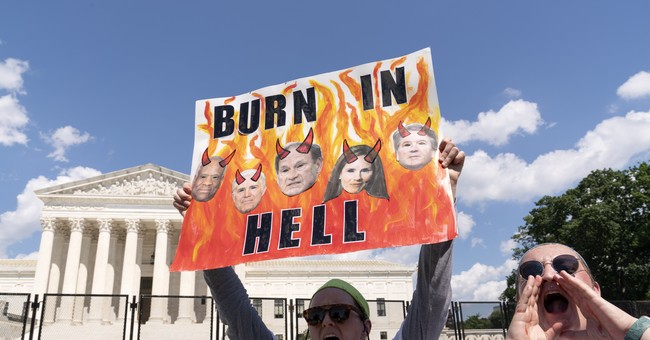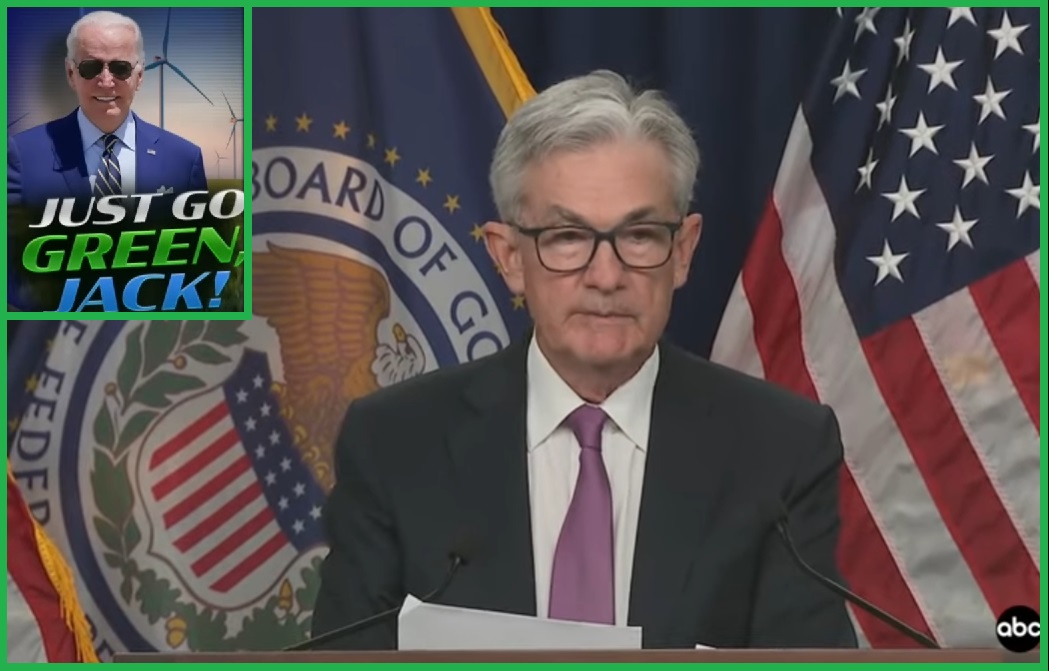Facebook founder Mark Zuckerberg’s admission last week that the FBI pushed the social media giant to censor Russian misinformation — and thus the Hunter Biden laptop story, as that’s how the agency and Democrats characterized it — shortly before the November 2020 election is but a breadcrumb of a bigger scandal: the widespread interference by the FBI in the 2020 presidential election with the potential that the bureau coordinated its efforts with the Biden campaign.
When asked during a Thursday podcast with Joe Rogan how Facebook handles controversial news, such as the Hunter Biden laptop story, Zuckerberg stopped his host to provide a backdrop to Facebook’s decision to decrease distribution of the scandal.
“The FBI basically came to us, some folks on our team, [saying,] ‘Hey just so you know, you should be on high alert,” Zuckerberg told Rogan. According to Zuckerberg, the bureau told Facebook that “we thought there was a lot of Russian propaganda in the 2016 election” and that “we have it on notice that basically there’s about to be some kind of dump similar to that so just be vigilant.”
As Zuckerberg told “The Joe Rogan Experience” podcast audience, “Hey, look, if the FBI — which I still view as a legitimate institution in this country, it’s a very professional law enforcement — they come to us and tell us we need to be on guard about something, I want to take that seriously.” So, when the New York Post broke the Hunter Biden laptop story on October 14, 2020, Facebook treated the story as “potentially misinformation, important misinformation” for five to seven days while the tech giant’s team could determine whether it was false.
During that time, Facebook decreased its distribution of the story by making the story rank lower in the news feed. “You could still share it, you could still consume it,” Zuckerberg explained, but “fewer people saw it than would have otherwise.” And while he would not quantify the impact, the Facebook founder said the decreased distribution was “meaningful.”
In a follow-up, Rogan asked if the FBI had specifically said “to be on guard about that story,” meaning the laptop story. After originally responding, “no,” Zuckerberg corrected himself, saying, “I don’t remember if it was that specifically, but it basically fit the pattern.”
Whether the FBI identified the Hunter Biden laptop story as the about-to-drop Russian misinformation, however, is irrelevant because the warning the bureau provided Facebook proved specific enough for the Big Tech company to censor distribution of the New York Post’s story. And, contrary to fake intel the FBI provided Facebook’s team, the laptop was not Russian disinformation but a true and devastating story showing Joe Biden had lied to the American public when he claimed in September of 2019 that he had never discussed his son’s foreign business dealings. Information on the laptop further implicated the Democrat presidential candidate in a pay-to-play scandal involving Russia, Ukraine, and China.
The implications flowing from Zuckerberg’s revelation are huge and raise a litany of questions that demand answers.
We Need Answers
First, it is implausible to believe Facebook is the only Big Tech company contacted by the FBI with a warning about Russian disinformation and the bureau’s expectation being that tech executives would then censor the Biden scandal. Rather, it is only reasonable to believe the FBI issued similar false warnings to Twitter and other outlets.
And while Facebook only limited distribution, Twitter completely censored the story, preventing it from being shared at all on the platform. Twitter also temporarily locked Trump’s campaign account to prevent the then-president from sharing the laptop story and suspended the New York Post’s account.
Did the FBI’s warning prompt Twitter’s censorship as it had Facebook’s? What other Big Tech companies did the FBI contact to paint the Hunter Biden laptop story as misinformation? What network and cable news outlets received a similar message? What about print and legacy media companies? Who within the FBI issued the warnings? With whose knowledge? With whose authorization? Or by whose directive?
A second component to the scandal concerns the FBI’s interactions (or lack thereof) with the Biden campaign. According to John Paul Mac Isaac, the owner of the Delaware laptop repair shop where Hunter Biden abandoned his laptop in mid-2019, the former’s father approached the FBI on October 8, 2019, on his behalf to alert the FBI to the laptop’s existence. During that meeting, Isaac’s father claimed he told the agent there was pornography on the laptop as well as information about “dealing with foreign interests, a pay-for-play scheme linked to the former administration, lots of foreign money.”
Isaac’s father left the local FBI office believing the bureau was uninterested in the laptop, but then two months later, in December of 2019, two federal agents appeared at Isaac’s Wilmington repair store with a subpoena and seized the laptop. Isaac had previously made a copy of the hard drive, however, and later provided the copy to Rudy Giuliani who, in turn, gave a copy to the New York Post, prompting the stories the FBI then tried to censor by falsely flagging it as Russian disinformation.
What the FBI did with the laptop after taking possession of it remains unknown, although FBI whistleblowers now claim that “local FBI leadership told employees ‘you will not look at that Hunter Biden laptop.’” Wisconsin Sen. Ron Johnson revealed the whistleblowers’ claims in a letter he sent to the inspector general of the Department of Justice last week. That letter further stated that the “whistleblowers allege that the FBI did not begin to examine the contents of Hunter Biden’s laptop until after the 2020 presidential election — potentially a year after the FBI obtained the laptop in December 2019.”
If, as the whistleblowers allege, the FBI did not review the content of Biden’s laptop until after the 2020 presidential election, that constitutes yet another scandal because from what Isaac’s father conveyed to the agent in October of 2019, the laptop represented a national security threat.
The FBI and the intelligence community cannot possibly defend the country from threats if it blinds itself to what those threats are. Nor could the intelligence community properly provide Joe Biden with a defensive briefing if agents remained ignorant of the content of the laptop. And as I previously reported, that content included the revelation by Hunter Biden that he believed Russians had stolen a second laptop with material that put him at risk for blackmail. So if the whistleblowers’ claims prove true, the FBI and the intelligence community put the election of Joe Biden above America’s national security.
Either way, the FBI lied to Facebook and presumptively Twitter and many other media outlets. If the FBI had analyzed the laptop, it knew it was not Russian disinformation; if agents had not yet assessed the material, it had no basis to claim it was Russian disinformation.
What Did the Big Guy Know?
The question remains, though: What did the FBI tell Joe Biden about the laptop?
While it would be completely inappropriate for the FBI to bury the laptop and withhold a defensive briefing from the Democrat presidential candidate, it is possible the FBI took that tack to provide Biden with plausible deniability. But once the FBI knew the story was about to break, what did the bureau do, besides lying to Big Tech companies that the story represented Russian disinformation?
And we know from the Post’s October 14, 2020, story on the Hunter Biden laptop that the FBI had foreknowledge of the Post’s plan to run the story, as did Hunter Biden and the Biden campaign. “The FBI referred questions about its seizure of the laptop and hard drive to the Delaware US Attorney’s Office, where a spokesperson said, ‘My office can neither confirm nor deny the existence of an investigation,’” the Post reported. The Post added that “Hunter Biden’s lawyer refused to comment on the specifics but instead attacked Giuliani,” and “the Joe Biden campaign did not return requests for comment.”
After the Post reached out to the FBI and Biden for comment on the story, did the FBI tell Biden how it came to possess Hunter’s laptop and that it appeared legitimate? Or did agents lie to Biden?
Here, a comment Biden made in crosstalk during his October 22, 2020, presidential debate with Trump in Nashville proves intriguing.
After Biden intoned that the election was about the character of the country, Trump countered, “If this stuff is true about Russia, Ukraine, China, other countries, a wreck — if this is true, then he’s a corrupt politician. So don’t give me the stuff about how you’re this innocent baby. Joe, they’re calling you a corrupt politician.”
“It’s the laptop from hell, the laptop from hell,” Trump continued.
Biden initially countered by pointing to the “50 former national intelligence folks who said that what this, he’s accusing me of is a Russian plan.” “Four, five former heads of the CIA, both parties, say what he’s saying is a bunch of garbage,” Biden claimed.
“You mean, the laptop is now another Russia, Russia, Russia hoax?” Trump barked.
At this point, the crosstalk escalated, but Biden could be heard saying, “That’s exactly what — that’s exactly what I was told.”
Was Biden lying? Or did someone tell Biden that the laptop was Russian disinformation? Did the FBI and intelligence community lie to the Democrat candidate about the authenticity of the laptop, rather than provide Joe Biden with a proper defensive briefing? If so, who lied? Who knew of the lie? Who approved the lie or directed it?
And what about Hunter? Did Biden ask his son about the laptop? What did Hunter say? Did Biden know the FBI was lying about it being disinformation and just go along with that narrative?
These questions barely scratch the surface, with more serious questions concerning whether the FBI plotted with the Biden campaign to push the Russian disinformation narrative and to seek censorship of the story. And before writing that off as a crazy conspiracy theory, remember that it was Zuckerberg — the Zuck Bucks king — who revealed that the FBI had approached him and warned that the about-to-be dumped story was Russian disinformation. So we know the FBI holds responsibility for pushing the disinformation canard to Big Tech, we just don’t know whether agents coordinated the plan with the Biden campaign.
A review of contemporaneous reporting also reveals that the intelligence community pushed the Russia disinformation narrative through leaks to the New York Times and Washington Post.
The same day the story broke, in reporting on the Hunter Biden laptop article published by the Post, the New York Times reported that “some security experts expressed skepticism about the provenance and authenticity of the emails,” citing “United States intelligence analysts.”
According to the Times, American intelligence analysts had contacted Burisma — the Ukrainian energy company at which Hunter served a lucrative gig on the board of directors — to learn more about a purported hack of Burisma by “the same Russian GRU unit that was one of two groups that hacked the Democratic National Committee in 2016.” The Times reported that the intelligence analysts “had picked up chatter that stolen Burisma emails would be leaked in the form of an ‘October surprise.’”
Citing its American intelligence sources, the Times then claimed that “among their chief concerns … was that the Burisma material would be leaked alongside forged materials in an attempt to hurt Mr. Biden’s candidacy — as Russian hackers did when they dumped real emails alongside forgeries ahead of the 2017 French elections — a slight twist on Russia’s 2016 playbook when they siphoned leaked D.N.C. emails through fake personas on Twitter and WikiLeaks.”
The speed with which the New York Times spun the Hunter Biden laptop story, and the assist by the unnamed “U.S. intelligence analysts” suggests a coordinated effort by individuals in the intelligence community to protect Biden’s candidacy by framing the New York Post’s coverage as Russian disinformation.
Less than a week after the New York Post broke the laptop story, the Washington Post likewise bolstered the disinformation narrative based on FBI leaks. “What’s more, numerous news outlets have now reported that the FBI is examining whether the material from Hunter Biden (which supposedly includes salacious stuff) is linked to a Russian disinformation effort,” the Washington Post reported on October 20, 2020, adding that “intelligence officials had previously warned that Giuliani is a conduit for such disinformation.”
The FBI and U.S. intelligence analysts’ peddling of the Russia disinformation narrative to the New York Times and Washington Post further expands the deep state’s culpability in interfering in the 2020 election and also leads to more questions.
Who provided the media outlets with leaks to spin the Hunter Biden laptop scandal as Russian disinformation? Who knew of the leaks, and who approved them or directed them? And did the FBI and intelligence community coordinate with the Biden campaign in pushing the Russia disinformation narrative to the legacy media?
How Deep Does the Corruption Go?
Other questions concern what prompted “more than 50 former senior intelligence officials” to sign “on to a letter outlining their belief that the recent disclosure of emails allegedly belonging to Joe Biden’s son ‘has all the classic earmarks of a Russian information operation.’” Did the FBI or other members of the intelligence community help coordinate that letter?
Given the FBI took the initiative to prompt Facebook and almost certainly other media outlets to censor the Hunter Biden story, it’s entirely reasonable to think the same deep-state liars would round up former members of the cabal to sign the letter to further the disinformation narrative.
If so, did Joe Biden or his campaign know about the efforts? Or did the Biden campaign merely exploit what the FBI was doing behind the scenes?
And make no mistake, even if Biden’s team did not conspire with the FBI to cause the censorship of the Hunter Biden laptop story, it exploited the FBI’s gratuitous interference in the election, with the Biden campaign pointing to social media’s censorship as proof that the story was disinformation.
“Well, look, I think Twitter’s response to the actual article itself makes clear these reported allegations are false and are not true, and I’m glad to see social media companies to take responsibility to limit misinformation,” campaign press secretary Jamal Brown said shortly after the story broke.
Biden likewise hid behind the spin pushed by the 50-plus former national intelligence agents that framed the laptop as Russian disinformation, as demonstrated by his debate performance highlighted above.
Whether Biden coordinated with those former deep-staters, or they conspired with the FBI, merits investigation as well because, at the end of the day, the burying of the Hunter Biden laptop story cost Trump the election.
As the Washington Times reported earlier this year after the New York Times belatedly acknowledged the authenticity of the laptop: “Trump pollster John McLaughlin found that 4.6% of Biden voters would have changed their minds if they had known about it, easily enough to flip results in key states. Another survey by The Polling Company showed that even more Biden voters in seven swing states — 17% — would have switched their votes if they had been aware of the laptop and other stories.”
Those poll results confirmed what many conservatives had long thought — that by censoring the laptop story and the Biden family’s pay-to-play scandal, Big Tech stole the election from Donald Trump.
But Zuckerberg’s admission on Thursday that Big Tech throttled the story at the behest of the FBI reveals a deeper scandal: It was the FBI and not social media that stole the election from Donald Trump.








 That extra $200/month equates to $2,400 per year.
That extra $200/month equates to $2,400 per year.
.JPG)